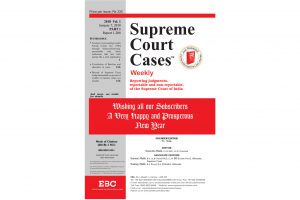SCC Issue dated February 7th, 2021 (Vol. 1 Part 5)
Read the Prashant Bhushan Contempt judgment methodically analysed by our Editors, where the Supreme Court elaborately discussed the caution, care, ambit and scope of criminal contempt jurisdiction. The Court also ruled on the maintainability of criminal contempt proceedings initiated suo motu by the Supreme Court under Article 129 of the Constitution, without consent of the Attorney General for India [(2021) 1 SCC 745]
Short notes: 8
Advocates who appeared in this case: Dushyant Dave and Sajan Poovayya, Senior Advocates.
Contempt of Court — Criminal Contempt — Exercise of contempt jurisdiction — Caution, care, ambit and scope: Contempt jurisdiction is a special jurisdiction, which has to be exercised sparingly and with caution. There must be balancing of contempt jurisdiction, with right to offer healthy and constructive criticism, which is fair in spirit must be left unimpaired in the interest of the institution of the judiciary itself. Principles explained regarding caution, care, ambit and scope of contempt jurisdiction. [Prashant Bhushan, In re (Contempt Matter), (2021) 1 SCC 745]
Criminal Law — Criminal Procedure Code, 1973 — S. 439 — Interim Bail: In this case, there were allegations of abetment of suicide against the appellant-accused. Conditional interim bail was granted and it was held that the High Court was in error in rejecting applications for grant of interim bail in this case. Direction was given to appellants to cooperate in investigation and that they shall not make any attempt to interfere with ongoing investigation or with witnesses. [Arnab Manoranjan Goswami v. State of Maharashtra, (2021) 1 SCC 802]
Criminal Procedure Code, 1973 — S. 320 — Amicable settlement/compromise between parties — Relevance of, to reduce quantum of sentence of convicts even in serious non-compoundable offences: Unequivocal language of S. 320(9) explicitly prohibits any compounding except as permitted under S. 320. Notwithstanding thereto, fact of amicable settlement/compromise between parties can be a relevant factor for purpose of reduction in quantum of sentence of convicts even in serious non-compoundable offences. [Murali v. State, (2021) 1 SCC 726]
Criminal Procedure Code, 1973 — S. 438: Anticipatory bail in triple talaq case: Anticipatory bail can be granted to a person apprehending arrest under the Muslim Women Act, 2019 subject to conditions that: competent court must hear married Muslim woman upon whom the triple talaq is pronounced, and all the requirements specified in S. 7(c) of the 2019 Act are satisfied. S. 438 CrPC is not superseded by S. 7(c) of the Muslim Women (Protection of Rights on Marriage) Act, 2019. Scope and manner of operation of non obstante clause under S. 7 of the 2019 Act, explained. [Rahna Jalal v. State of Kerala, (2021) 1 SCC 733]
Government Contracts and Tenders — Formation of Government Contract — Blacklisting/Debarment of contractor: Form and content of show-cause notice is important. There is mandatory requirement to mention that action of blacklisting is proposed; or it should be possible to draw clear inference to this effect from notice. [Vetindia Pharmaceuticals Ltd. v. State of U.P., (2021) 1 SCC 804]
Penal Code, 1860 — Ss. 302 or 304 Pt. II and 376 — Liability of accused — Absence of intention of killing — Effect of: In this case, offence was committed by a young person against the victim, a young girl of 16 yrs. While committing sexual assault on the victim and during the course of intercourse, accused with all his strength put both of his hands on neck of the victim, who was suffering from motions and vomiting, and by such act she suffered suffocation and died. Considering manner of occurrence, the accused held to have no intention for causing the death of the deceased after intercourse on her. Resultantly, considering factual and legal position, the High Court while maintaining conviction under S. 376 held to have rightly converted conviction under S. 302 into one under S. 304 Pt. II and, thus, sentencing accused to ten years’ rigorous imprisonment. [State of A.P. v. T. Prasanna Kumar, (2021) 1 SCC 720]
Penal Code, 1860 — Ss. 302, 363, 366 and 376(2)(f) — Death sentence: This case of child rape and murder was based on circumstantial evidence and the appellant became the victim of his own past. Considering these factors, death sentence converted to sentence of total 25 yrs of imprisonment. [Dileep Bankar v. State of M.P., (2021) 1 SCC 718]
Wildlife (Protection) Act, 1972 — Schs. I to IV and Ss. 39(1)(a), 49-A, 51, 2 and 9 — Offence of capture or possession of wildlife species listed in Schs. I to IV — When made out: Capture or possession of species belonging to genus to which species specified in Schedules to Wildlife Act belongs or a related or infra species, but not being the very species specified in the Schedules to the Wildlife Act is not enough to constitute offence under the Wildlife Act. [Titty v. Range Forest Officer, (2021) 1 SCC 812]

